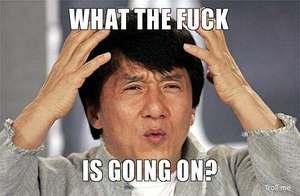I just got into a leeeeeeetle disagreement over on the Facebooks over this:
My views on this are that Clare Cullen is a massive ledgeface* who you should all go subscribe to immediately because she is saying words that basically mirror rants I have inside my head every single time anyone runs for election, ever. We don’t elect people to be Official Fixers Of The World and Havers Of Opinions. We elect people to particular jobs with specific responsibilities and powers. It’s insulting to the electorate (you know, the people who you’re asking to employ you) if the material you’re using to persuade people to vote for you is either vague to the point of meaninglessness or refers to things that are drastically outside the remit of the job you’re actually applying for.
Anyway, one of the people she targets is the Socialist Party** candidate, Paul Murphy, who’s looking to get reelected to the European Parliament. Grand so. She’s got criticisms that I see as legit- overly negative campaigning with a lack of actual alternatives put forward. Anyway, since I’m a leftie myself and since Ireland is a tiny country where everyone knows everyone, it was inevitable that a bit of a palaver would ensue. Which is fine. It’s just that.. there’s something that happened there that I disagree with hard enough to write a blog post about it, and that was this comment by CH- someone who, by the way, I respect a shedload and who gave me the okay to :
Paul is running on a platform of party ideals/alternatives (anti-capitalist) to domestic policy and EU. It is merely to have a voice to raise issues that are railroaded in the EU and their wider agenda of Austerity… maybe you missed the part about wanting a socialist alternative not band aids for bullets wounds of capitalism. It not about legislative change which is a narrow outlook of oppositions role anyway.
Okay. You see, this? This is something I have a huge issue with. Not necessarily when it comes to policy or perspective- I agree with a bunch of Murphy’s views. But with CH’s defence of his actions. Let me explain why.
The Role of a Legislator Is To Legislate
The first thing that I want to take issue with is this:
It not about legislative change which is a narrow outlook of oppositions role anyway.
There are many ways to do opposition. Shedloads of ’em. Despite what you hear, working through parliaments (as well as stuff like voting etc) is just one way of many to create change. In fact, I’d go further than that. The vast majority of the time here in Ireland, any legislative change that is enacted on social issues happens after shifts in public opinion. If you want to create change without engaging directly with the legislate process? Do that! Do grassroots work. Educate and communicate your views. Work at the local level to create models of how you’d like things to be done, and put in the everyday work of keeping those things going. Protest and demonstrate. Campaign, or provide support to campaigns. Write a book or a blog, submit articles for people to read, start a vlog if you like.
There’s many, many ways- most of which I’m sure I haven’t mentioned- that you can help to bring about the change you’d like to see which don’t involve legislation. Legislation is one tiny piece of a huge jigsaw.
But if you’re going to apply for a job as a legislator? I expect you to be interested in legislating. Period. End of sentence.
I expect you to take that job with the intent of working your butt off for your entire term at legislating. And I expect you to show me that you can get legislation passed. I expect you to be willing to grit your teeth, hold your nose and work on the compromise legislation that isn’t exactly what any of us want because the alternative is so much worse. If you’re not wiling to do that, then you have no business looking for that job. There are many other spaces where your voice would be better used.
Hell to the Yes, I Want That Bandaid.
Let’s go to the next part.
maybe you missed the part about wanting a socialist alternative not band aids for bullet wounds of capitalism
To describe short-term legislative change as “band aids for bullet wounds of capitalism” is to use some pretty strong words and make some extremely strong assumptions. I’m going to take three premises out of this, and address them in order:
- That the harm caused by capitalism can be likened to a bullet wound- that is, is not just extremely serious but requires urgent action.
- That the small changes possible through immediate legislative change can be likened to a band-aid: something that will cover the wound, staunch the bleeding, but won’t do anything about the bullet lodged within you.
- That tackling immediate needs and creating long-term substantial change are mutually exclusive.
My answer to the first? Yep, there sure are some extremely harmful things going on which need to be addressed urgently. I wouldn’t personally use the single term ‘capitalism’ to describe the forces causing these- I think it’s a whole lot more complicated than that and there’s a lot of forces involved, and I also prefer to think of capitalisms as opposed to one unitary thing. But I have a feeling that that kind of pedantry isn’t terribly useful right here. Let’s agree that there’s some seriously harmful stuff happening and we need to do something about it, sharpish.
It’s when we get to the second part that we’re going to start to disagree. You describe the kind of legislative change possible from the EP as bandaids. I’d use a different metaphor: they’re more like first aid. Sure, they’re not the well-equipped intensive care unit of culture-wide change creating a society where each of us is able to live without fear of destitution and has real opportunity to thrive. But first aid will keep you alive. First aid is the thing that’ll keep you breathing until the ambulance gets here.
Theory can never, ever trump practicality
That third premise is one I have even more difficulty accepting than the other two. If that’s the case, then you need to take a long, hard look at where your theory is coming from, because I have no interest in theory that puts itself before people’s real and immediate needs.
A real alternative to the way we’re doing things now is all well and good, but some of us- a lot of us- don’t have the luxury of theory. Because of piss-poor, inadequate legislation here in Ireland, people now have a higher chance of surviving pregnancies that threaten their lives than they did a couple of years ago. Piss-poor, inadequate legislation means that as long as I don’t work in a school or a hospital I probably won’t get fired for not following Catholic dogma, the way I could back in the ’90s. It’s ludicrous that pregnant people have to travel overseas for abortion services if their lives aren’t in danger, and it’s a disgrace that the RCC can hide behind ‘ethos’ to force people into closets. But it’s better than nothing, and I’m glad we don’t have to live without it.
In short? If you’re not going to actually attain that socialist alternative next week then fuck yes I would like some bandaids please. And if you can’t hold your nose and enact piss-poor legislation that is all you can get but better than nothing? Then there are far better places to take your activism than Parliament.
*Translation for non-Irish people: most excellent person who does things I approve of greatly.
** Surprise for you USian people- ‘Socialist’ isn’t actually a dirty word ’round this neck of the woods. Woop!












.jpg/1024px-Conchita_Wurst,_ESC2014_Meet_%26_Greet_08_(crop).jpg)

